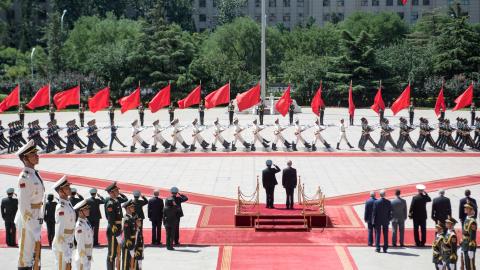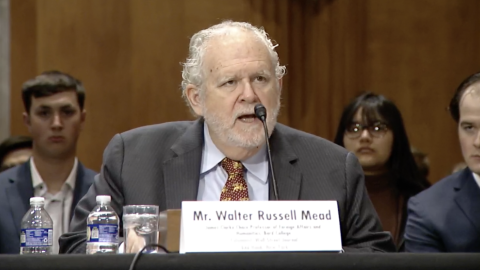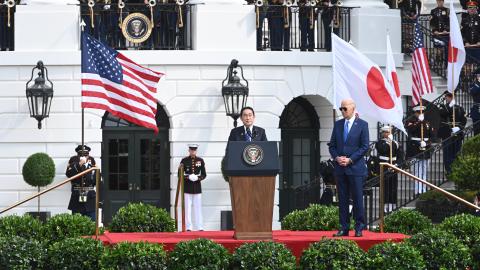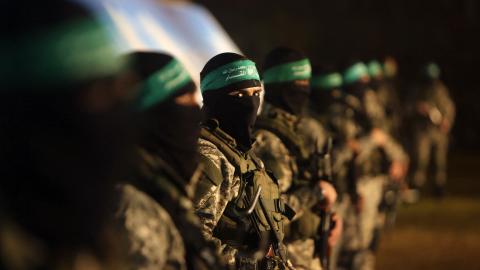With the world’s attention riveted on the stunning aerial clash between Iran and Israel, it is easy to lose focus on Gaza. But the war there remains unresolved.
President Biden supported Israel against Iran’s April 13 drone and missile barrage. U.S. military forces even shot down some of the Iranian weapons fired at Israel.
Similarly, the president had shown solidarity with Israel after Hamas’s October 7 surprise attack. A few days after that attack pulled Israel into an unwanted war, President Biden declared with passion, “We’re with Israel.” Stressing Israel’s right to defend itself, the president said, “Hamas does not stand for the Palestinian people’s right to dignity and self-determination. . . . They use Palestinian civilians as human shields. Hamas offers nothing but terror and bloodshed.”
But now, though Hamas battalions remain entrenched near Gaza’s border with Egypt, the Biden administration presses Israel to stop fighting. Mr. Biden asserts that humanitarian concerns require a prolonged ceasefire to alleviate the suffering of Gazan civilians. But would such a ceasefire actually serve humanitarian purposes?
The president does not say Hamas has been sufficiently dismantled. Ending the war immediately would allow Hamas to survive and retain military and governing power. Leaving it in the area containing the Sinai-Gaza smuggling routes would ensure that Hamas can rearm. This is why Hamas leaders now plead for a ceasefire.
A ceasefire will provide some relief for Gazans today, but a prolonged ceasefire will preserve Hamas’s bloody oppression of Gaza and make future wars with Israel inevitable.
Should humanitarians have called for a ceasefire to relieve suffering civilians in the American South during the Civil War—or starving German civilians in World War II? In the decades following those wars, both America and Germany have been far better off than if humanitarians, to reduce civilian casualties, had saved the Confederacy and the Nazi regime from destruction. Lincoln, Churchill, and Roosevelt were correct on the moral calculus that prioritized defeating their enemies’ repressive and dangerous regimes. Domestic victims of those regimes ultimately benefited, as did the cause of international peace.
For most Gazans, even when there is no hot war, Hamas’s dictatorship is a nightmarish tyranny. Hamas rule features the torture and murder of regime opponents, official corruption, extremist indoctrination of children and misery for the population in general. Hamas diverts foreign aid and other resources from proper uses; instead of improving life for the mass of the people, it uses the funds to fight against Palestinians and Israelis. Hamas’s goals are to overshadow the Palestinian Authority, win control of the West Bank, and establish Hamas leadership over the Palestinian revolution. Hamas’s ultimate aim is to spark a regional war to obliterate Israel and, as Hamas leaders steadfastly maintain, fulfill a Koranic vision of killing all Jews.
When Hamas provokes hot wars with Israel, which it does periodically, the suffering of ordinary Gazans intensifies. Perversely, Hamas intends this result because it knows it can exploit that suffering for strategic purposes.
Hamas planned for corpses of Palestinian babies and mothers to serve as the mainspring of its October 7 war plan. Hamas calculated it could survive a war against a superior Israeli force and energize enemies of Israel around the world. The key to both aims was arranging for grievous Palestinian civilian losses. If successfully blamed on Israel, the dead Gazan noncombatants might spur uprisings by Arabs and Muslims everywhere and would fuel demands for a ceasefire that would allow Hamas to claim victory.
To these ends, Hamas worked for a decade and a half to put military assets in and near schools, hospitals, mosques, and residences—and to build its enormous, dense network of tunnels underneath Gaza’s cities. That network extends over 350 miles, within Gaza’s narrow 141 square miles. It is longer than London’s famed Underground, which serves an area more than four times the size. The network includes an estimated 5,700 vertical shafts, many of which emerge in ordinary homes.
Senior Hamas official Mousa Abu Marzouk, in an October 27, 2023 television interview, explained that Hamas built underneath civilian homes and businesses not to safeguard civilians, for “it is the job of the United Nations to protect them,” but because “We are fighting from inside the tunnels,” and Hamas fighters have “no other way of protecting ourselves.”
To defend itself, Israel had to reach Hamas fighters in the tunnels. To do that, it had to devastate civilian life in Gaza, just as Hamas intended. Hamas counted on these deaths to fuel international demands for Israel to halt its offensive prematurely. Hamas, saved, would emerge successful.
The human-shield strategy that Biden decries would be bad enough. But someone who uses human shields is usually hoping to deter enemy attack, not to kill the shields. What Hamas is doing is worse. It is employing a human-sacrifice strategy, intentionally increasing civilian casualties among its own people.
Hamas’s hiding among civilians is a war crime against the people of Gaza. We make this point not to be legalistic but to stress the scheme’s immorality. Perpetrators of such immorality would under normal circumstances be widely condemned. Regarding the war in Gaza, however, people speaking in the name of humanitarianism are working to reward Hamas for this crime.
While it was able to kill or capture over 1,400 Israelis, Hamas’s October 7 attack did not produce all its intended results. Hamas leaders wanted the massacre and subsequent fighting in Gaza to spur Israeli Arabs to riot as they did in support of Hamas in May 2021. Hamas similarly aimed to spark large-scale uprisings in the West Bank, Lebanon, and beyond. To Hamas’s embarrassment, Ramadan just passed without any of the hoped-for eruptions of violence abroad.
So far, at least, Hamas has not ignited such disturbances, nor triggered a multi-front war against Israel while the Israeli army is tied down in Gaza. Iran’s April 13 aerial attack on Israel was aggressive and dangerous but constrained by the Iranian leaders’ fears of Israel and its American and other friends. It proved humiliatingly unsuccessful and was hardly the overwhelming regional conflagration that would have answered Hamas’s prayers.
No doubt Hamas and its Iranian patron hoped that the October 7 attack would stop the movement among Muslim countries toward normalizing relations with Israel. Yet Saudi Arabia seems intent on resuming its normalization diplomacy after Israel defeats Hamas (though they may not do so if Hamas is seen to have won this war). And, to boot, Indonesia is reported to be talking with Israel about opening diplomatic relations.
The cruel reality is that the production and exploitation of Gazan dead bodies are an especially successful aspect of Hamas’s war plan. Hamas has mastered the diplomatic alchemy that converts corpses of Gazan babies into worldwide support for the regime that arranged for the death of those babies.
That element of Hamas’s war plan is working impressively, largely because President Biden, voicing distress about Gazan civilian losses, is supporting demands for a ceasefire that would deliver victory to Hamas. Israel strains to avoid causing such losses, and President Biden knows this. Israel does so for humane reasons and because it understands that Hamas capitalizes on noncombatant casualties. Mr. Biden also knows that America, if provoked as horribly as Israel has been, would not stop its war against a terror group on its border until it completely destroyed the group. Yet the president has let himself be swept along by the wave of voices demanding “ceasefire now.” At the same time, his words provide much of the energy propelling that wave.
A ceasefire would not long deliver Gazan civilians from violence. In an October 2023 television interview, top Hamas official Ghazi Hamad said the October 7 massacre was “just the first, and there will be a second, third, and fourth” because Hamas is committed “to do this again and again.” After each of these attacks, Hamas would once again hide behind Gazan civilians. “We are proud to sacrifice martyrs,” added Hamad. By “martyrs” he means the Palestinian children, women, and other noncombatants whom Hamas leaders, for their own purposes, have doomed.
Some argue for an immediate ceasefire to stop what they characterize as indiscriminate attacks by Israel. They cite civilian deaths and buildings destroyed.
Improper actions, by accident or on purpose, occur in all wars. The Israeli army has already admitted terrible errors that killed Israeli hostages and World Central Kitchen personnel. Analyses of specific cases can be expected to establish other improper actions in this protracted and complex urban-war campaign. Perhaps one day well-informed investigators will conclude that the Israel army could have crafted an entirely different military plan that would have produced fewer Gazan noncombatant casualties. If so, there will be, as there should be, an accounting, as there has been for the military planners in other democracies who devised the many imperfect campaigns of other wars.
Foreign experts, however, have already noted—here and here, for example—that Israel’s general policy in Gaza is not only to avoid harm to civilians but to take measures to minimize such harm. They say that Gazan casualties and buildings destroyed are not out of line with the destruction brought on by other urban wars, despite the extensive tunnels and Hamas’s determined efforts to keep civilians in harm’s way. Israel has met with horrific difficulties—and lost hundreds of its own soldiers—in battling roughly 37,000 Hamas and Palestinian Islamic Jihad fighters in Gaza. That it could have achieved its aims there while avoiding substantial destruction and suffering among the general population is highly doubtful.
If the United States can help Israel reduce avoidable civilian deaths, it should of course do that. Israel holds its people to account for failures, and the United States can encourage this by making a practice of crediting it, as White House spokesman John Kirby has sometimes done.
It is in the interests of America and the civilized world to reject Hamas’s scheme of ensuring civilian suffering in Gaza and then taking advantage of that suffering. Allowing Hamas to remain in power would reward the gravest of war crimes. It would pave the way for more barbarity—by Hamas and others. It would give rise in future years to more civilian deaths, and not just among Gazans, but in neighboring Arab states and, of course, in Israel.
Delivering victory to Hamas would be bad policy as well as bad morality. No one who, like President Biden, retains faith in an Israeli-Palestinian “two-state solution” should want to protect Hamas, much less to help Yahya Sinwar and its other leaders extend Hamas control to the West Bank. And, as Iran’s April 13 aerial attack has made obvious, Hamas’s October 7 massacre was not an isolated event, involving only Israel and the Palestinians, but part of a broader Iranian strategy to use proxy forces to increase Tehran’s power throughout the Middle East. In other words, if Hamas wins, Iran wins. That would make losers of the United States, Israel, and Iran’s Arab enemies in Saudi Arabia, the United Arab Emirates, Bahrain, Jordan, Egypt, and elsewhere.
President Biden can advance U.S. strategic and moral interests, shore up the law of war and safeguard the humanitarian interests of the Gazans by shoring up U.S. support for eliminating Hamas’s military and governing capabilities. This means providing Israel with unwavering diplomatic support and timely military equipment and aid. The president should recommit the United States to Hamas’s destruction, not to a premature ceasefire.















